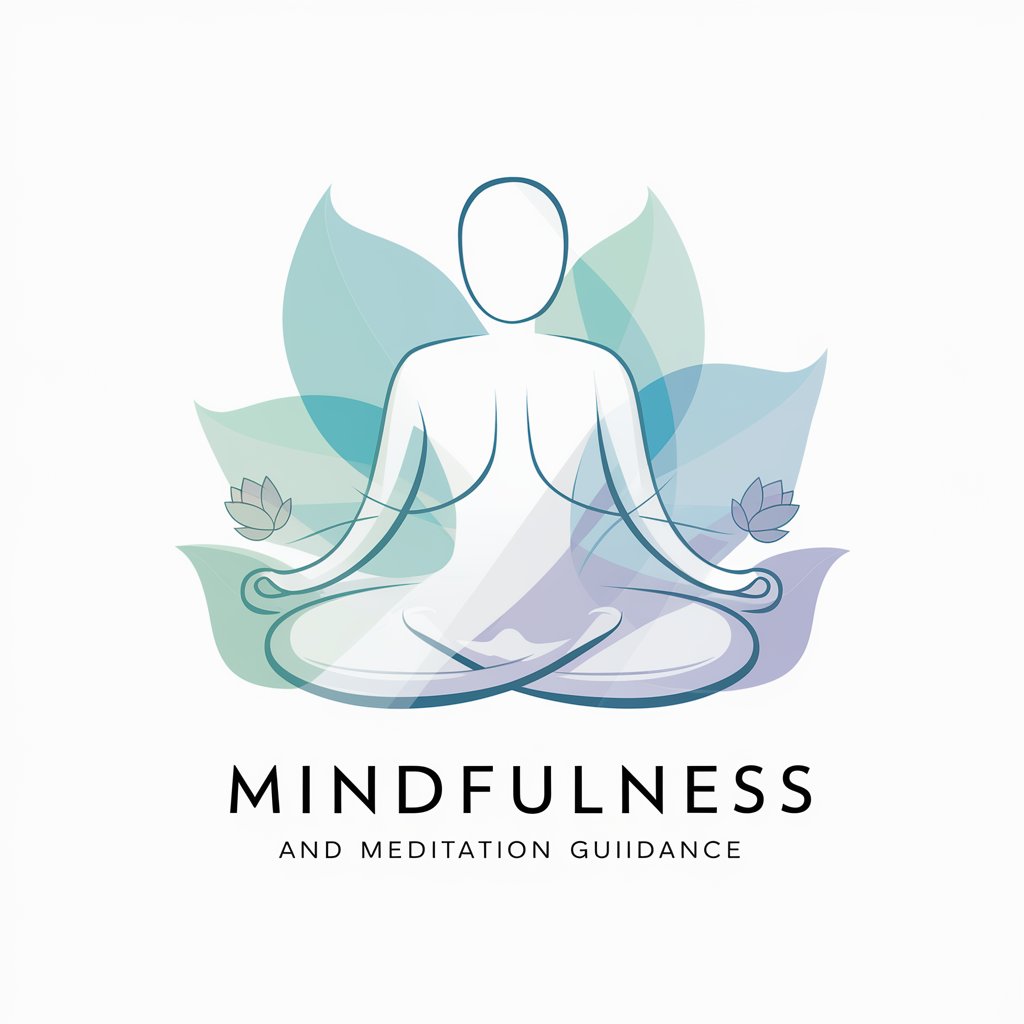Mindfulness and meditation techniques - Mindfulness Meditation Access

Welcome! Let's embark on a mindfulness journey together.
Elevate your mind, empower your life
Describe your experience level with meditation and mindfulness practices.
How much time can you dedicate to meditation each day or week?
What specific goals are you aiming to achieve with meditation?
Where do you prefer to meditate, and what is your ideal setting?
Get Embed Code
Understanding Mindfulness and Meditation Techniques
Mindfulness and meditation techniques encompass a wide range of practices aimed at enhancing mental clarity, emotional stability, and overall well-being. These techniques are designed to help individuals cultivate a state of awareness and presence, allowing them to observe their thoughts, feelings, and sensations without judgment. The purpose of these practices is not to empty the mind of thoughts, but to become more mindful of one's thoughts and surroundings. Examples include focused attention meditation, where one concentrates on a single point of interest such as the breath; mindfulness meditation, which involves paying attention to thoughts as they arise and pass without engagement; and loving-kindness meditation, aimed at fostering a sense of compassion and love towards oneself and others. Scenarios where these practices are particularly beneficial include managing stress, enhancing concentration, improving sleep, and cultivating a deeper sense of inner peace. Powered by ChatGPT-4o。

Core Functions and Real-World Applications
Stress Reduction
Example
Mindfulness-Based Stress Reduction (MBSR) programs
Scenario
An individual experiencing high levels of stress at work participates in an 8-week MBSR program, learning to manage stress through mindfulness practices. The program includes guided meditations, yoga, and daily mindfulness exercises, leading to reduced stress levels and improved emotional regulation.
Improving Focus and Concentration
Example
Focused Attention Meditation
Scenario
A student struggling with concentration begins practicing focused attention meditation daily, concentrating on their breath for 10 minutes each morning. Over time, this practice enhances their ability to focus on their studies and maintain concentration for longer periods.
Enhancing Emotional Well-being
Example
Loving-kindness Meditation
Scenario
An individual feeling disconnected and lonely incorporates loving-kindness meditation into their routine, focusing on sending feelings of love and kindness towards themselves and others. This practice fosters a sense of connectedness, improves relationships, and enhances overall emotional well-being.
Promoting Better Sleep
Example
Body Scan Meditation
Scenario
A person with insomnia practices body scan meditation before bed, focusing on each part of the body in turn to relax the mind and body. This technique helps improve sleep quality by reducing the time it takes to fall asleep and increasing the duration of deep sleep.
Target User Groups for Mindfulness and Meditation
Individuals Experiencing Stress
People facing high levels of stress from work, personal life, or other sources can greatly benefit from mindfulness and meditation techniques. These practices help in managing stress, reducing anxiety, and improving resilience.
Students and Professionals Seeking Improved Focus
Students and professionals looking to enhance their concentration and productivity can utilize meditation techniques designed to improve focus. These practices aid in reducing distractions and enhancing the ability to stay present with tasks.
Those Seeking Emotional and Psychological Well-being
Individuals looking to improve their emotional health, whether dealing with feelings of depression, loneliness, or seeking a deeper sense of happiness, can find value in the emotional regulation benefits of meditation and mindfulness.
People with Sleep Disorders
Individuals struggling with insomnia or other sleep disorders may benefit from mindfulness and meditation practices like the body scan, which can promote relaxation and facilitate a more restful sleep.

Utilizing Mindfulness and Meditation Techniques
Start Your Journey
Begin by visiting yeschat.ai to initiate a no-cost trial that doesn't require a login or ChatGPT Plus subscription, enabling easy access to mindfulness and meditation resources.
Identify Your Needs
Assess your current mental and emotional state to determine your specific needs, such as stress reduction, improved focus, or better sleep. This will guide the selection of suitable mindfulness and meditation techniques.
Choose Your Technique
Select a technique that aligns with your experience level and goals. Beginners may start with guided mindfulness meditations, while more experienced practitioners might explore advanced meditation practices.
Set a Routine
Establish a regular practice schedule that fits your daily routine, whether it's a short session each morning or longer sessions a few times a week. Consistency is key to experiencing the benefits.
Create Your Space
Designate a quiet, comfortable space for your practice. This could be a dedicated room at home, a peaceful outdoor setting, or any place where you can meditate without interruptions.
Try other advanced and practical GPTs
Flight Finder
Navigate the skies with AI precision.

Flight Finder
Navigate the skies with AI-powered ease.

Flight Finder
AI-powered, personalized flight booking

Flight Scout
Your AI-powered Travel Companion

Flight Finder
Soaring high with AI-powered flight deals

Editor Pro
Unleash Creativity with AI-Powered Editing

Christian Bale
Empowering Human-like Interactions with AI

Christian Guide
AI-powered New Testament Explorer

SEO Master Writer
Empower Your Writing with AI-Driven SEO

EconoSummarizer
Summarizing economics with AI precision.

Biomedical Content Explorer
AI-powered Biomedical Text Analysis

Toy Character Detective
Discover toy stories with AI magic.

FAQs on Mindfulness and Meditation Techniques
What is the best meditation technique for beginners?
For beginners, guided mindfulness meditation is often recommended. It involves focusing on your breath and being present in the moment, which helps cultivate awareness and reduces stress.
How long should I meditate each day?
The duration can vary based on personal preference and schedule. Starting with 5-10 minutes daily and gradually increasing the time can be beneficial for building a sustainable practice.
Can meditation help with anxiety?
Yes, meditation can significantly reduce anxiety levels. Mindfulness meditation, in particular, helps by bringing your attention to the present, reducing the tendency to ruminate on anxious thoughts.
Is it better to meditate in the morning or at night?
Both times have benefits. Morning meditation can set a positive tone for the day, while evening meditation can help unwind and improve sleep quality. Choose what best fits your routine.
What are the physical benefits of meditation?
Meditation can lower blood pressure, reduce chronic pain, improve sleep, and enhance overall well-being by reducing stress and promoting relaxation.
